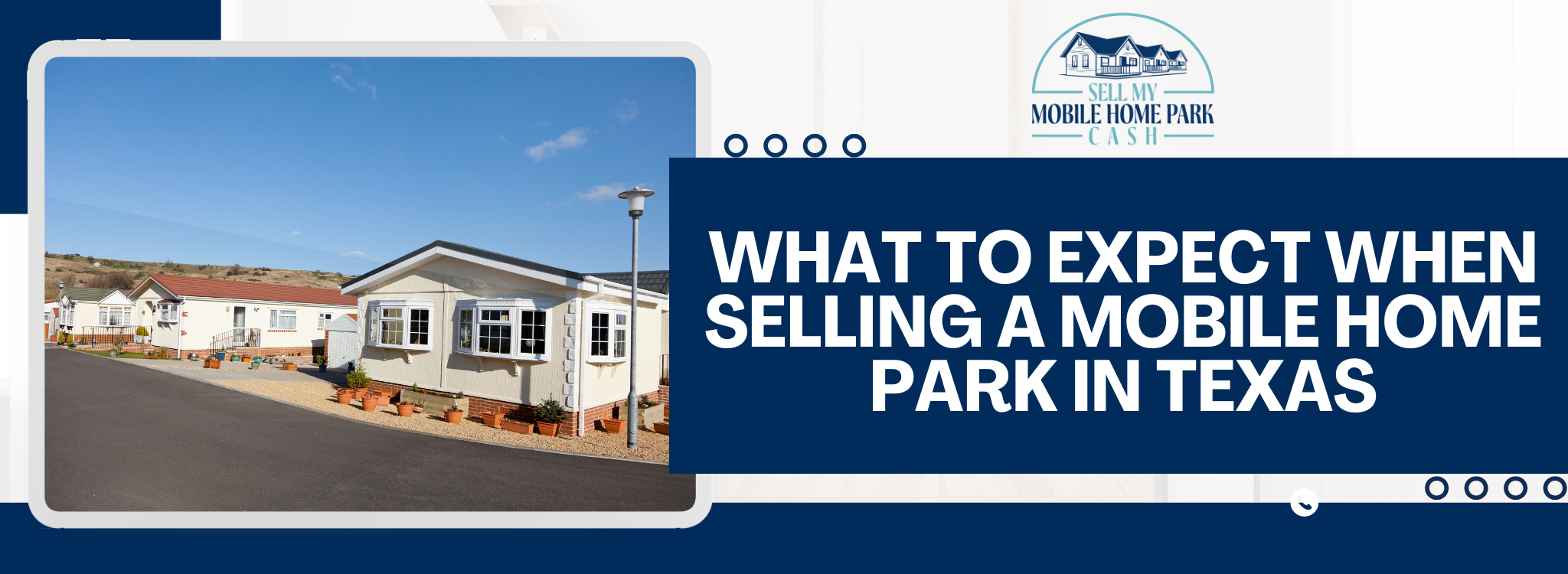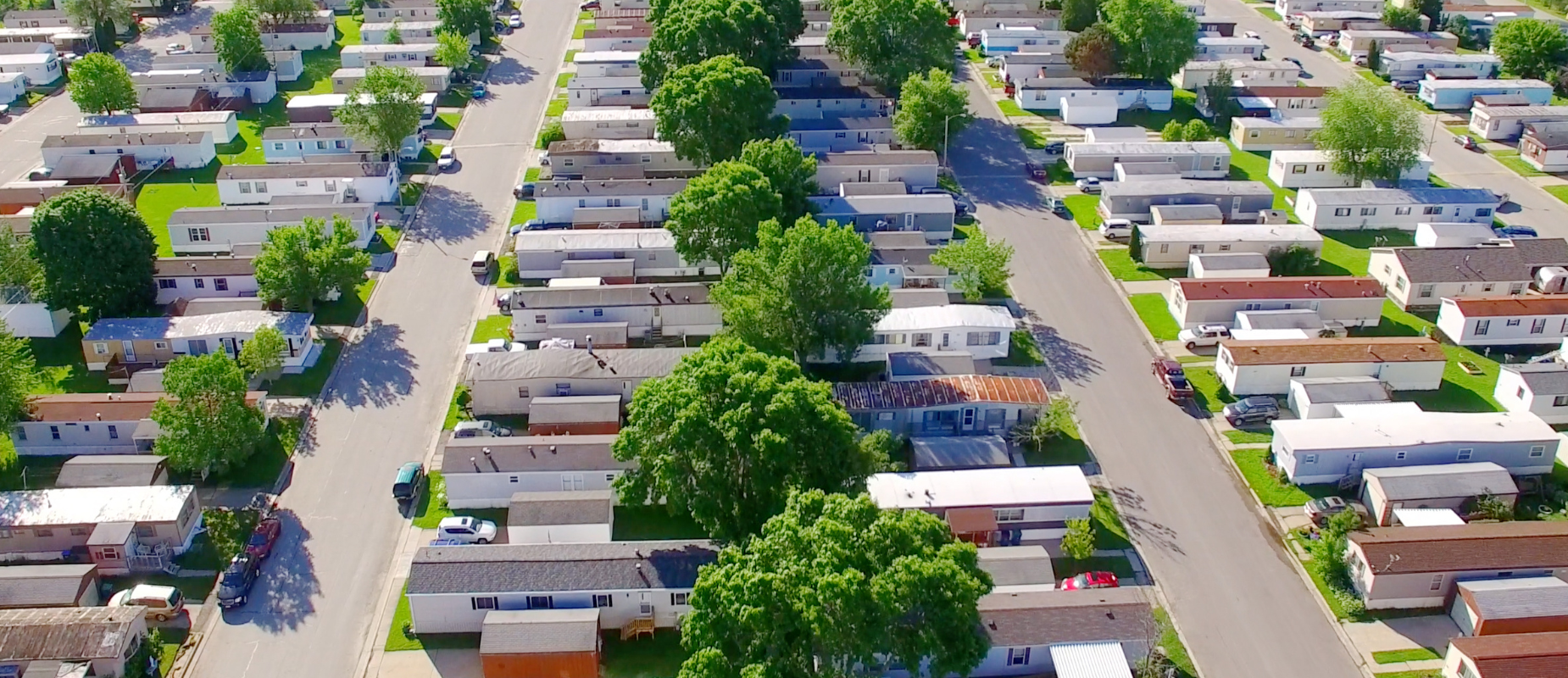
How to Prepare Your Mobile Home Park for Sale
What Initial Steps Should You Take?

When you’re ready to sell your mobile home park, start with a property appraisal. This will help you determine its market value and set a fair price. It’s important to know the market trends in Texas mobile home parks since these can impact your property’s valuation.
Arrange for a professional appraisal focused on mobile home parks. Based on current market analysis, this will provide details about your park’s worth. Look into regional real estate trends to develop a good pricing strategy to attract potential buyers.
How to Improve the Curb Appeal?
Making your mobile home park look nice is key to selling it. First impressions are important, so spend some time landscaping and fixing things. This will make your property more attractive to buyers.
Here’s how to boost your park’s appearance:
- Landscaping: Regularly trim bushes, plant flowers, and mow the lawn.
- Maintenance and Repairs: Fix issues like potholes or broken fences.
- Inspection Report: Get a property condition inspection report to find areas that need improvement.
These steps not only make the park look better but also increase its value in the eyes of buyers.
What Documents Are Necessary?
Having all the right documents is very important when selling your mobile home park. Buyers will want to see these to feel confident about their purchase.
Essential documents include:
- Ownership and Title Documents: Ensure ownership papers are current and easy to find.
- Financial Statements and Records: Present detailed financial records to show the park’s earnings.
- Seller Disclosure Requirements: Follow local rules by preparing disclosures about known problems.
- Title Transfer for Mobile Home Parks: Know the steps for transferring titles to ensure a smooth process.
- Due Diligence: Support buyer investigations by having all necessary documents organized and available.
Preparing these documents will make the sale process smoother and help build trust with buyers.
Navigating Legal Considerations in Texas
What Federal and State Regulations Apply?

Selling a mobile home park in Texas involves understanding specific legal rules. Both federal and state laws need to be followed to ensure regulatory compliance. In Texas, mobile homes have unique regulations affecting sales. The Texas Real Estate Commission (TREC) oversees the market, including mobile home parks.
Key points include:
- Regulatory Compliance: Ensure all parts of the sale follow federal and state laws.
- Legal Considerations: Be aware of necessary permits and licenses affecting the sale.
- Zoning Regulations: These laws decide where mobile home parks can be located and the conditions for their sale.
Being familiar with these regulations helps smoothen the selling process and reduces legal risks.
How Does Zoning Affect Your Sale?
Zoning rules are crucial in selling mobile home parks. They dictate what types of activities can occur on the property, impacting permits and environmental factors.
- Zoning Classification: Check your property’s zoning type to see if it matches your sale plans.
- Permits and Title Transfer: Changing property use might require new permits or affect the title’s transfer process.
- Environmental Concerns: Ensure the property abides by environmental laws that might affect the sale.
Understanding zoning rules can help prevent delays during the sale.
What Should You Know About Liabilities?
Selling a mobile home park comes with risks and liabilities. Knowing these can protect you from future legal trouble.
- Legal Risks: Learn about potential legal issues involved in the transaction.
- Insurance Coverage: Make sure you have enough insurance to cover unexpected liabilities.
- Contract Contingencies: Include clauses to handle issues that could arise during the sale.
- Seller Disclosure Requirements: Disclose any known property issues to buyers as required.
Addressing these liabilities can reduce risks and make the sale process smoother.
For more help, contact our team at Sell My Mobile Home Parks Cash. We are here to assist you with selling your mobile home park in Texas.
Engaging with Potential Buyers

Selling your mobile home park starts with finding the right buyers. You can do this by advertising your mobile home park for sale in targeted ways. Using online listings for sale can help you reach more people.
Knowing the market trends in mobile home parks, especially in Texas, is important. The Texas real estate market has unique chances for sellers, and knowing these trends can help you present your property well. Using real estate marketing strategies can highlight features investment groups look for in mobile home park buyers.
Understanding buyer demographics is also key. Who usually invests, and what do they want? Meeting buyers’ needs increases the chance of a successful sale.
What Role Do Brokers Play?
Brokers are very helpful when selling a mobile home park. A real estate agent in Texas can guide you through the sales process, from listing to closing. Knowing real estate commission rates in Texas sets clear expectations for brokerage services.
Picking a skilled broker who knows the investment potential and details of selling trailer parks is essential. They help with property negotiations and ensure you get a great offer. Brokers also do a market analysis to give insights into the competition and negotiate the sale of your mobile home park. Their roles include checking potential buyers and giving advice on strategic choices.
How to Evaluate Offers Effectively?
When considering offers for your mobile home park, you must thoroughly check buyer qualifications. Knowing the buyer’s financial health is important when considering seller financing or other offers.
Start with a complete property appraisal to determine your mobile home park’s market value. This helps set competitive pricing strategies. During the offer assessment phase, thorough due diligence ensures that the buyer can fulfill their financial commitments and match your selling goals.
Negotiation tactics can help you get the best sale price for your mobile home park. Good communication with buyers and looking at competitive offers can lead to a better outcome. When reviewing different offers, balance getting a good sale price with meeting the buyer’s terms.
Financial Matters in Selling
What Are the Tax Implications?

When you sell a mobile home park, knowing the tax implications is important. In Texas, you’ll need to consider capital gains tax, which can affect how much profit you make from the sale. This tax is based on the difference between what you paid for the property and what you sell it for after accounting for any improvements.
Due to changing property values, the Texas real estate market can also influence your tax bill. Getting an accurate property appraisal is crucial to determining the real market value of your mobile home park. This helps ensure you don’t pay more in taxes than you should.
How to Handle Financial Negotiations?
Good financial negotiations are key when selling your property. To get the best deal, look at competitive pricing strategies. Check out current market trends and set a price that’s attractive but also meets your financial needs.
Here are some negotiation tactics:
- Work with a knowledgeable real estate professional in Texas. They can provide advice and support.
- Be willing to consider multiple offers and compare them to find the best offers.
- Set an initial price that allows negotiation while meeting your financial goals.
What Costs Are Involved in Closing?
Knowing the closing costs when selling a mobile home park is important for a smooth process. These costs include various fees, so being aware helps you manage them better.
Typical closing costs include:
- Property condition inspection report: This checks for any major issues before the sale.
- Allocation of funds involves deciding how to split the money from the sale between all parties involved.
- Fees related to the mobile home park sale process, like legal paperwork and title transfer fees.
Being ready for these costs can make closing the sale simpler and help you earn the most money from it.
Supporting Your Community During the Transition
How to Communicate Changes Effectively?

Clear communication is key when changes happen in your community. Keeping everyone in the loop can ease concerns and encourage participation. Here’s how:
- Organize Community Meetings: Set up regular meetings to share updates. Ensure these meetings include everyone and allow residents to ask questions.
- Consent and Feedback Loop: Get consent from residents before making big changes. Create a feedback system where residents can share their thoughts and feel heard.
- Information Dissemination: Spread information using newsletters, emails, and notice boards to ensure everyone gets the message.
What Support Can You Provide Residents?
Changes can be tough for residents, but the right support can help:
- Relocation Assistance: Offer help for those who need to move. Providing financial and logistical support can reduce stress.
- Understanding Tenant Rights: Teach residents about their legal rights, including lease agreements, and what changes mean for them.
- Legal Resources: Provide residents with access to legal help so they can handle complex issues. Work with local legal aid organizations to improve support.
- Community Support Initiatives: Build a supportive environment by organizing workshops, counseling, and informational sessions on real estate changes.
How to Address Resident Concerns?
Dealing with resident concerns quickly and well is important for keeping trust in the community:
- Establish a Feedback Loop: Let residents express their worries through surveys or suggestion boxes. Respond to their concerns to show they are valued.
- Legal Assistance: Ensure residents can access legal resources to understand their rights and choices. Provide contact information for local legal help.
- Continuous Communication: Keep communicating. Regular updates and clarifications can stop misinformation and reduce anxiety.
Focusing on these areas can help you support your community during times of transition, ensuring a smoother process and better outcomes for everyone. For more help or questions, contact Sell My Mobile Home Parks Cash for expert guidance and support.
This information is specific to Texas, where we specialize in buying mobile homes. Additionally, we purchase mobile home parks nationwide, extending our services to states such as Connecticut, California, New York, Florida, and many others. Whether you’re in Texas looking to sell a mobile home or anywhere in the country with a mobile home park to sell, we’re here to assist. For more details, Contact Us at (833) 685-2274 or visit our website. Let us help make the selling process seamless and stress-free!
FAQs:
What are the key steps in selling a mobile home park in Texas?
Selling a mobile home park in Texas involves several steps. First, get a professional appraisal to determine what your property is worth. Then, list your park on websites like MHVillage to attract buyers. You might also reach out to investment groups interested in mobile home parks. Consult a broker to help with the legal and paperwork requirements if needed.
How can I maximize the sale price of my mobile home park?
To get the best price for your park, improve its income potential and look. Fix any maintenance problems, like roofing issues, and aim for high occupancy rates. Make sure to show off any upgrades and keep good financial records. Also, market your park’s location benefits, such as near cities like Houston or Gainesville.
Are there specific legal considerations when selling a mobile home park in Texas?
Yes, you need to follow state regulations and might need a broker license. It’s important to know residents’ rights, which could involve working with Homeowners’ Associations. Also, ensure you have the right legal documents, especially if you sell due to divorce or foreclosure.
What economic factors influence the value of a mobile home park?
Economic factors like interest rates, market saturation, and local conditions can affect your park’s value. Trends in urban development and news can also change demand and pricing. Keeping track of these factors can help you set a fair sale price.
What challenges should I expect when selling my RV or mobile home park?
You might face challenges like strong market competition, keeping tenant relations smooth during the sale, and handling financing for buyers. Changes in the economy, like fluctuating interest rates, can also pose challenges. Planning with a solid exit strategy can help deal with these issues.
Is it beneficial to use a money order in transactions?
Money orders can be useful for small payments, but larger sales usually require more secure payment methods. To choose the best payment approach, it’s a good idea to talk to a financial expert.
Why should I consider professional appraisals and inspections before selling?
Professional appraisals and inspections give you a clear idea of your property’s value and condition. They help spot areas needing improvement. This information helps you make smart decisions about pricing and repairs, boosting your sales chances.
How does owning a Texas mobile home park differ from others?
Owning a mobile home park in Texas offers unique opportunities because of the state’s varied economy and development trends. However, you must know specific legal rules and resident rights that differ from those in other states. Understanding Texas’s market can lead to a successful sale.
Key Insights
- Are you selling a mobile home park in Texas? Understand management changes, especially for parks with RV areas. We can help you with both mobile home management and transitions.
- If you have a retailer or broker license, use it to your advantage during sales. It can affect negotiations and how buyers see your property.
- Texas mobile home parks attract unique groups of people. Knowing these buyer demographics can improve your sales plan.
- Investing in mobile home parks can be profitable. Before selling, check out financing options for buyers and consider insurance.
- Decide whether to do things yourself or hire professionals to assess and market your park for better value.
- Legal stuff is important. Follow all federal and state laws to avoid problems during the sale.
- Be ready for economic changes, city growth trends, and investment chances that might impact your park’s residents.
- Consider tenant rights in advance by looking at tenant reports and moving options. This helps everyone know their rights and duties.
- If the land sale involves prison concerns, research thoroughly and consult experts.
- Our team offers full advice and steps through the selling process, helping you make smart choices every step of the way.


